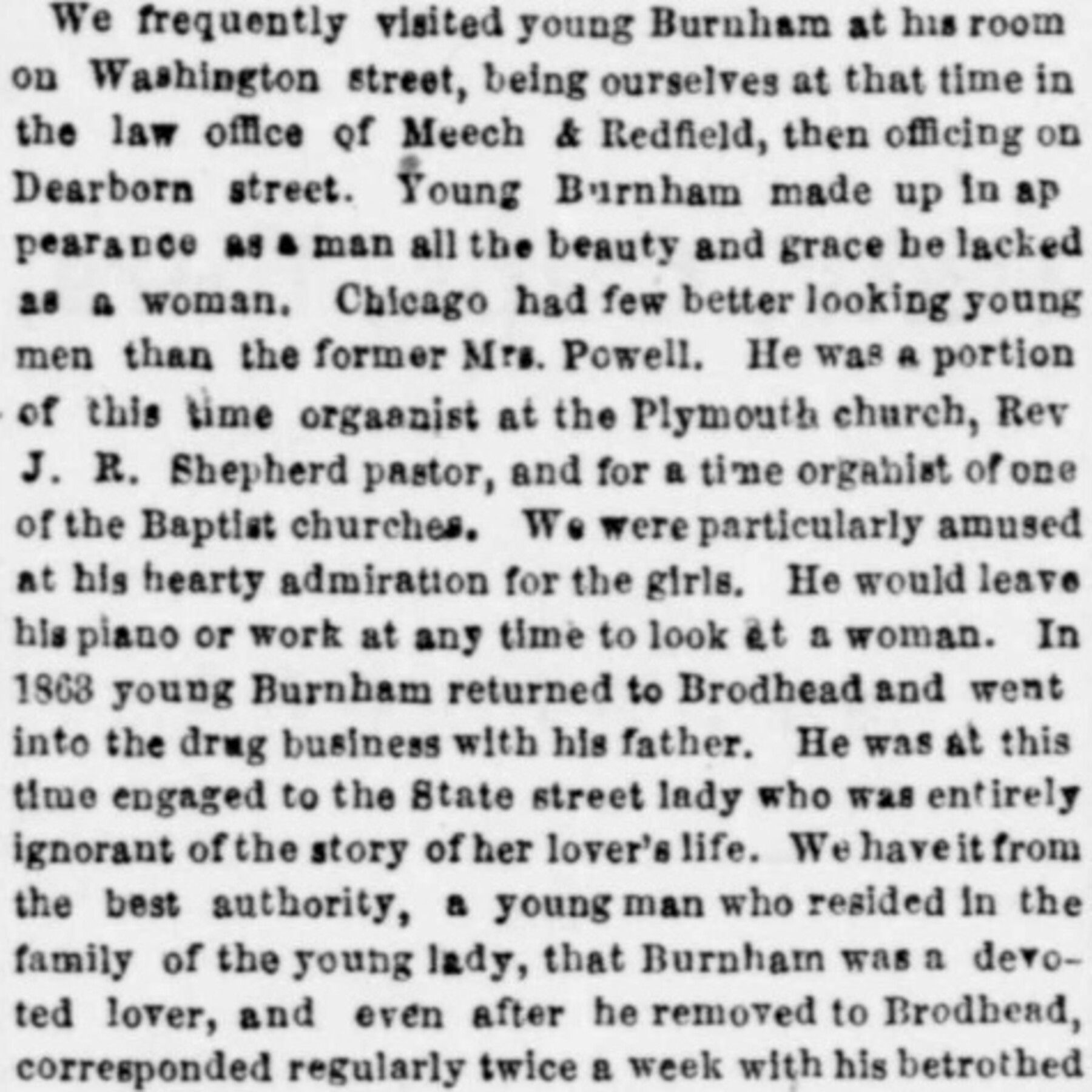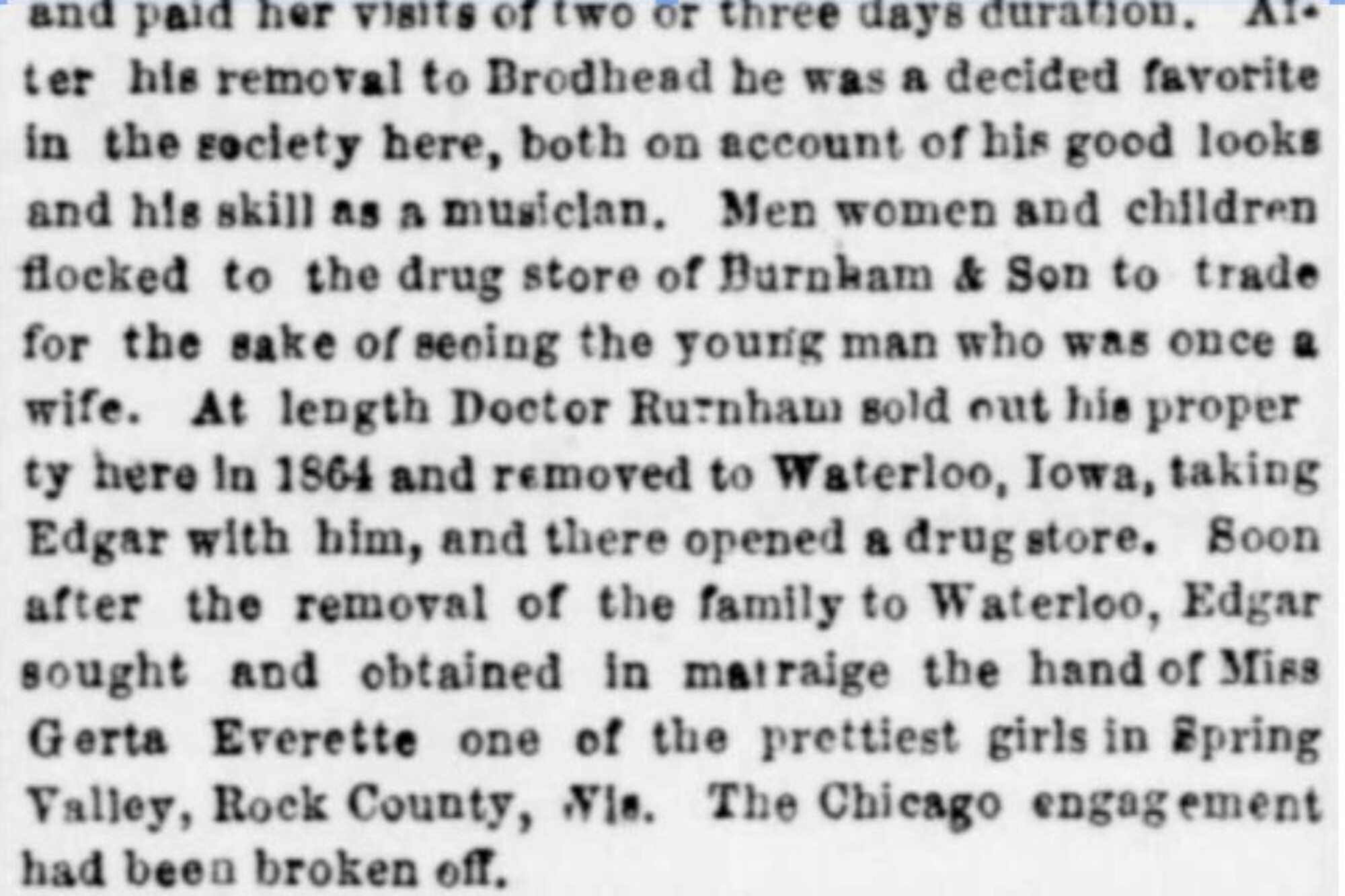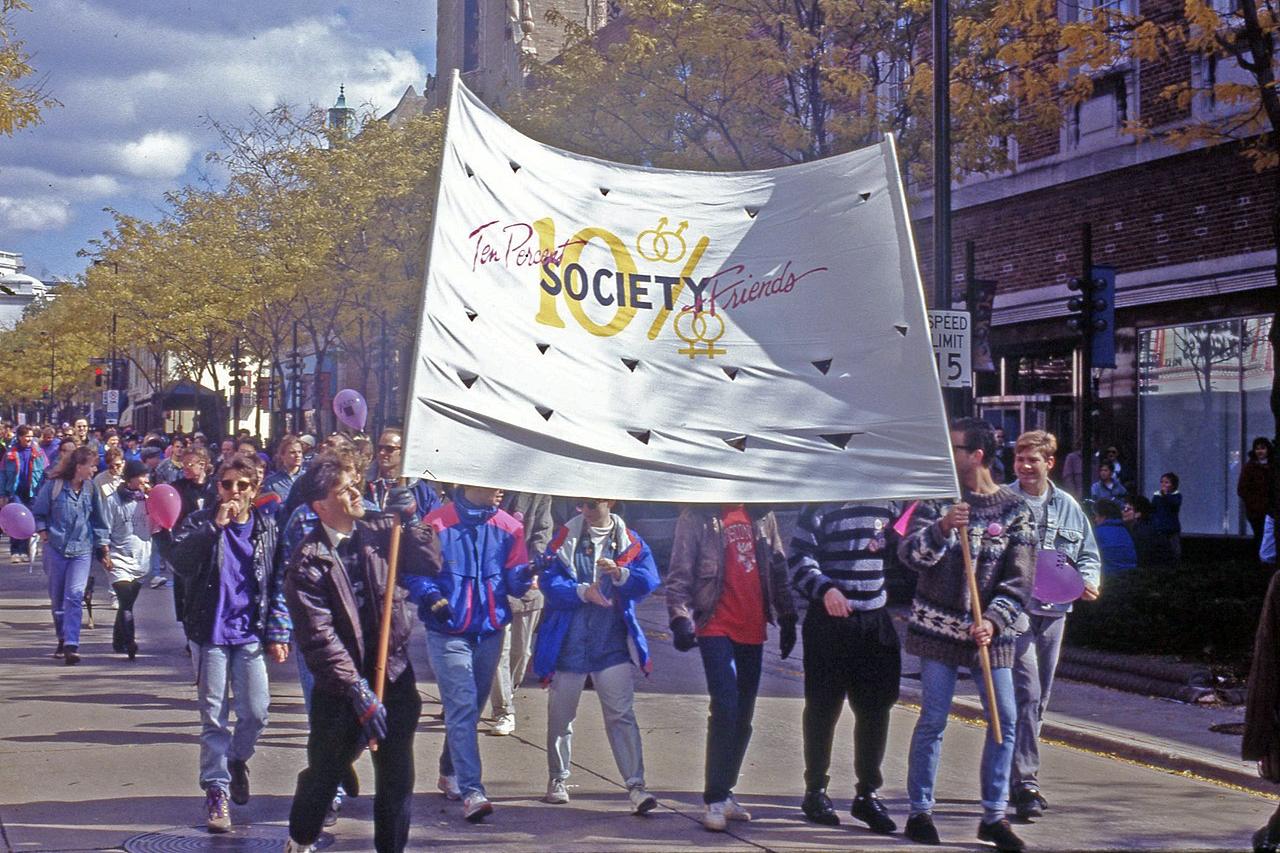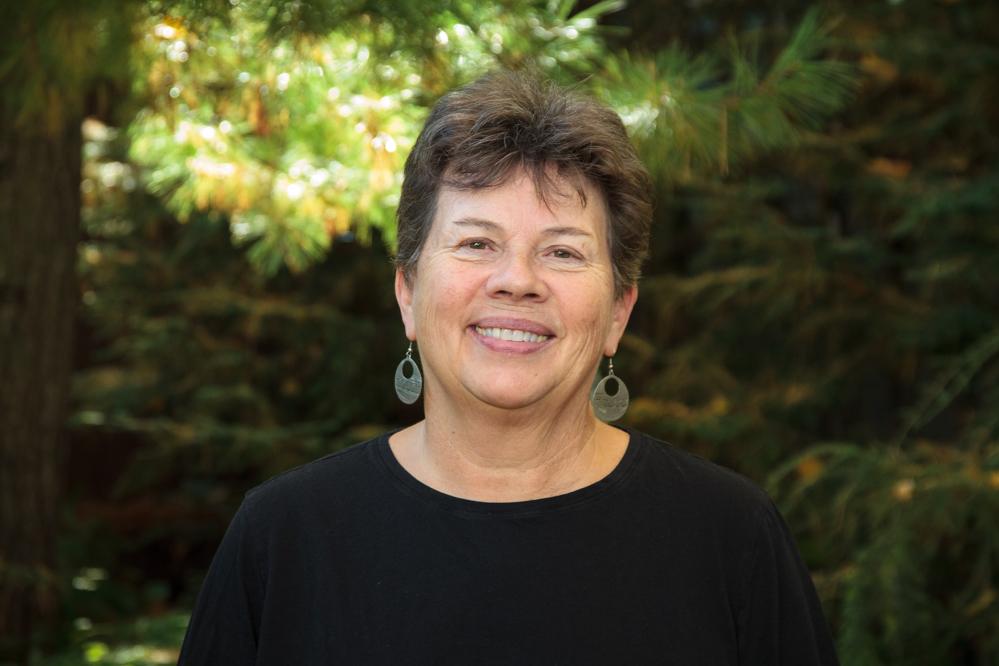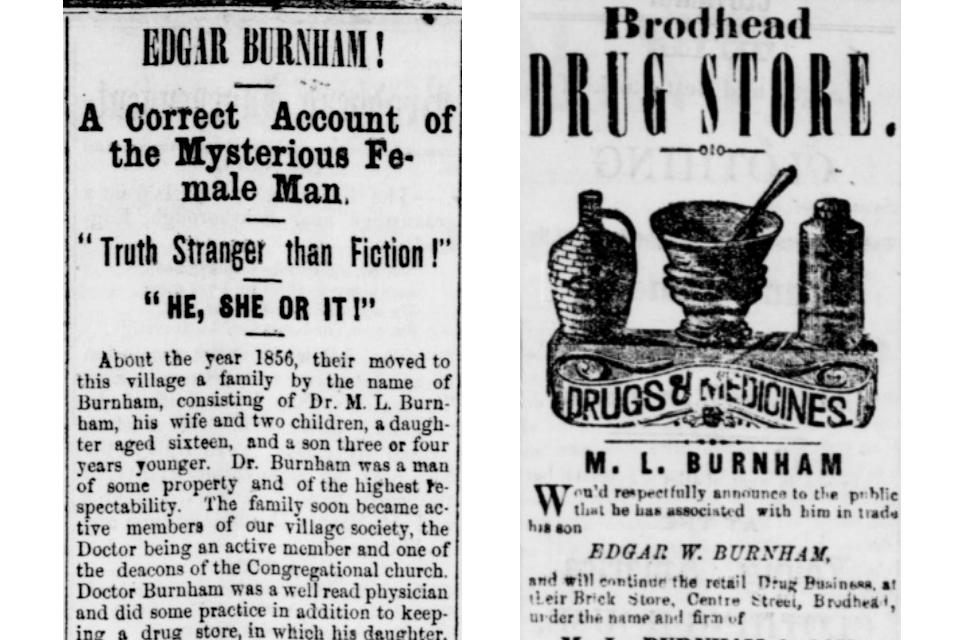
Edgar Burnham: a transformation of sex in Civil War Era Wisconsin

During the early 1860s, Edgar W. Burnham started living as a man with the support of his family and former husband. After he moved to Iowa, the story of his quiet transition was leaked by the press in La Crosse. After Edgar was outed in the national news, reporters from Brodhead came to his defense.
Edgar Burnham was born in Vermont on March 18, 1841, to Milo Lorenzo Burnham (1813-1893) and Ellen (Blish) Burnham (1817-1898). Originally assigned female at birth and named after his mother, he grew up in Vermont and New York before the Burnhams moved to Brodhead, Wisconsin in 1856.
In Brodhead, Milo owned and operated a drugstore, and Edgar was his assistant. As he grew up, Edgar fell in love with music, tutoring girls and women in piano, and L. W. Powell (1837-1895), founder and editor of the Brodhead Reporter. Edgar and Powell married on February 16, 1860.
During his early 20s, “Mrs. Powell” became increasingly masculine. He worked at the Reporter, smoked with his colleagues, and rode horses, seen as masculine activities. It came to a head during the fall of 1861, when Edgar was “mistaken” for a man — and then arrested — while returning from the nation’s capital. After accompanying Powell and the 7th Wisconsin volunteers to Washington D.C., Edgar boarded a train back to Brodhead, unknowingly followed by a detective who arrested him in Chicago under the assumption that he was a (male) Confederate spy disguised as a woman based on his smoking, horse riding, and appearance. He was released after Powell was called back from the capital to testify that Edgar was his wife.
In early 1863, at the age of 22, Edgar started living as a man. Around that time, Powell stepped down from the Reporter and moved to Chicago with Edgar. In a series of conversations lost to time, Powell and Edgar decided to separate, and Powell helped him acquire fitted men’s clothing, under the guise that the clothes were for a younger brother. It was in Chicago that Edgar began to go by the name Edgar Wales Burnham. (“Wales” was his maternal grandmother’s maiden name.) When his father learned that Edgar had become a man, he first asked that a physician examine him to explain his transformation of sex and then used his professional connections to help Edgar acquire work as a druggist.
After living his first year as a man in Chicago, Edgar returned to Brodhead in 1864. He once again assisted his father at the drugstore, which was renamed Burnham & Son. He also began tutoring piano again, but this time, he also sold pianos and organs. The Burnhams sans Edgar moved to Waterloo, Iowa in 1865. Edgar married his former tutee Gertrude Everett (1846-1891) on April 27, 1865, in Wisconsin before the pair joined his family in Iowa.
Almost three years into living in Iowa, the story of his transition became national news. Reporters from Waterloo wrote to major Wisconsin newspapers asking for details about this newer resident of their city. The La Crosse Democrat responded by publishing an article full of salacious gossip about his gender transformation — from his arrest during the war to whether he could mother or father a child, or both — in January 1868. The story was reprinted nationwide, with certain details modified and speculation added. Some reprints of the story even cast doubts on its truthfulness, with a handful of skeptical reporters claiming to have debunked “this remarkable fiction.”
On February 4, 1868, the Brodhead Independent (a former rival of the Reporter) published a story titled “Edgar Burnham! A Correct Account of the Mysterious Female Man” that told his story from the perspectives of those who knew him. The article concluded that while his life story as an “It” was unusual, he was ultimately a man, and a respectable one at that.
This would be a common theme whenever his story was revived in newspapers.
When the story was revived in Dakota Territory and Minnesota newspapers in 1882, for example, reporters emphasized that the strange Wisconsinite was now the proprietor of an opera company in Iowa and therefore a respectable man. When Powell was arrested in Chicago for vagrancy in 1889, the story of the fallen reporter was paired with mentions of Edgar’s successes as a businessman (and then a summary of his transition in the early 1860s) in nationwide stubs about the incident.
Despite details about his life in Wisconsin returning to newspapers multiple times for over two decades, Edgar never returned to the badger state himself. In 1889, he and Gertrude moved to California, where she passed away in 1891. He remarried a widow there and moved back to Chicago with her and her children, who took his last name, around 1900. Edgar W. Burnham lived out the rest of his life surrounded by his second wife and stepchildren while working as an organ salesman before passing away on April 30, 1918.
Long before the terms transgender, intersex, and gender affirmation existed, Edgar was recognized and treated as a man by his family and community in Brodhead.
Unlike other gender nonconforming people whose stories would follow his, reporters almost never doubled down on the idea that he was a woman “pretending” to be a man. Even as they considered if he was intersex, he was still referred to as a man. The intervention of the Brodhead Independent — his peers — helped dignify him in the public eye and changed the national conversation about one transformation of sex in south central Wisconsin.
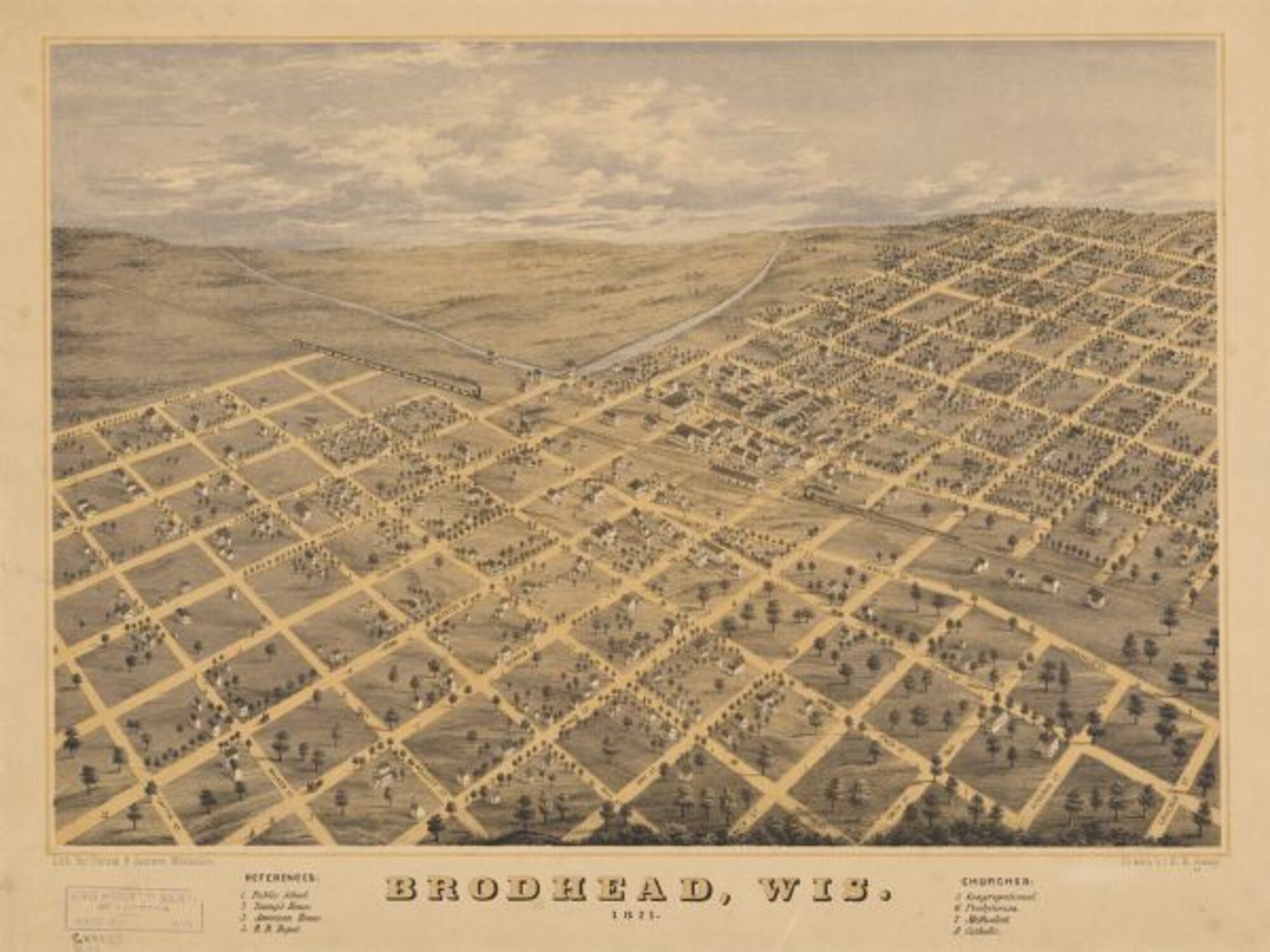 Broadhead, Wisconsin (1871)
Broadhead, Wisconsin (1871)
recent blog posts
March 22, 2025 | Michail Takach
March 21, 2025 | Michail Takach
March 19, 2025 | Kaleia Lawrence
The concept for this web site was envisioned by Don Schwamb in 2003, and over the next 15 years, he was the sole researcher, programmer and primary contributor, bearing all costs for hosting the web site personally.
